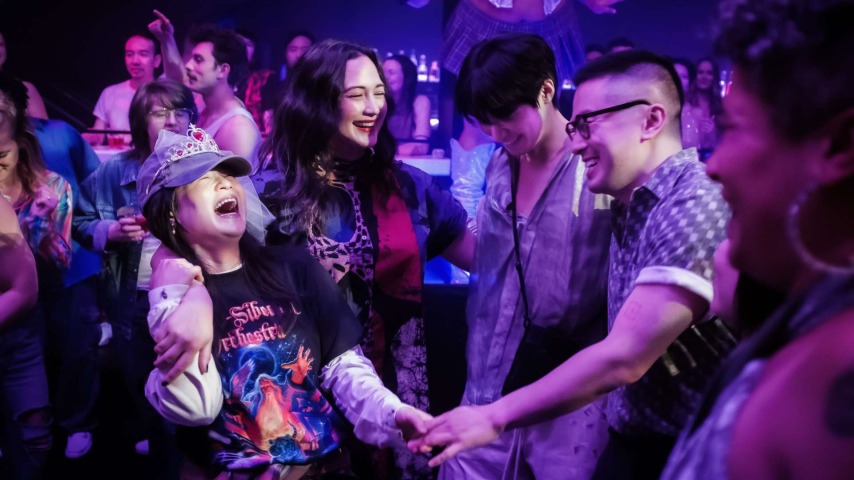In writer-director Andrew Ahn’s thoughtful, funny rom-com (and occasionally romantic melodrama) The Wedding Banquet, the menu consists of steaming, heaping portions of inherited trauma, served family-style. Led by a stellar cast, the intriguing and largely successful update to Ang Lee’s 1993 original, (written by Lee, Neil Peng, and James Schamus, the latter a co-writer on the reboot) follows a quartet of queer friends as they attempt to hoodwink Korean business executives, U.S. immigration officials, PFLAG, and, occasionally, themselves into presenting a perfect picture of uncomplicated, lasting heterosexual matrimony. Over the course of quickly tangling plots and limbs, the foursome discovers that their perfect scheme is doomed to fail because of a few key factors: namely, an inability to commit to their partners, much less the bit. The Wedding Banquet understands that, to queers of a certain anxious age, lifelong monogamous partnership is anything but simple.
Chris (Bowen Yang) and Angela (Kelly Marie Tran) are the two nerve-frayed best friends at the center of The Wedding Banquet’s whirlwind. Inseparable since their first confused, closeted hook-up during college orientation, they’re now practically family. Chris and his handsome, exuberant, and goofily earnest artist-slash-mega-trust-fund boyfriend Min (Han Gi-chan) live in the cozily outfitted shed in the backyard of Angela’s partner’s family home, which suits Angela and the grounded, sweet LGBTQ+ Center worker Lee (Lily Gladstone) just fine. While Lee and Angela are embarking on their second attempt at IVF, Min is preparing to ask Chris to marry him. The two couples couldn’t be more stable, both in their friendship and steadily escalating relationships—or so they think. In a one-two punch, Lee’s implantation doesn’t take, and Min’s grandmother Ja-young (Minari‘s arresting Oscar winner Youn Yuh-jung) informs Min that he’s overstayed his student visa in the United States, and it’s time that he begins working for the multinational family business.
When Lee and Min propose sincere fixes to their respective partners—that Chris and Min marry, partially so Min can apply for a green card, and that the younger Angela attempt to carry a child instead of Lee—they run smack into the very roadblocks Chris and Angela were attempting to bury. Chris doesn’t want to get married, and Angela doesn’t want to be a mother; not biologically, and maybe not at all. Attached to each of their reluctances are deep, gnawing fears that deserve time, space, and therapy. Instead, Min and Lee tipsily hatch a counter-proposal designed to bait their partners into fessing up: Min will marry Angela, and fund Lee’s next round of IVF in exchange.
The bonkers scheme lays the groundwork for The Wedding Banquet to play to the strengths of its ensemble. More nervous and dour than in his previous supporting turn in Ahn’s Fire Island, Yang’s Chris is smart and reactive, predictably slinging many of the script’s best lines. Tran believably unravels her people-pleaser, and she and Yang have the best chemistry of the bunch. The dynamic between Angela and her mother May (Joan Chen) is a close and complex second, while Youn and everybody she so much as glances at follows behind at a near third. Even in a lighter role than the timbre of their usual knockout performances, Gladstone is a centering, magnetic force against their chaotic counterparts, aided by their character knowing exactly what she wants and how to communicate with her nervous wreck of a partner. Not to be outdone, Han steals quite a few scenes with his near-absurdist deliveries.
Yet, the flipside of this treasure trove of performances—and Ahn’s attempt to give ample time and meaning to each—is that it feels a bit crowded at the dinner table. The weight of this falls on the shoulders of Chris’ younger cousin Kendall (enjoyably offbeat newcomer Bobo Le), whose brief expositional backstory comes off muddled and shoehorned. This is one of the film’s few pronounced flaws, but its most prominent dissatisfaction is more of a conversation starter than a structural problem: In a queer rom-com remake for the modern age, which takes the time to question institutions like marriage and heirs and heterosexual allyship, why do marriage and children remain the ultimate goal?
Lee’s convincing and nuanced reasons for wanting to settle down on her father’s land and start a family both flesh out her character and tie in her Indigenous background without too much heavy-handed explanation. Min’s answers are similarly suited to his character’s over-the-top sense of romance and devotion, and his disconnection from the realities of class. Chris and Angela, however, are left spinning their wheels around the respective questions of marriage and children. With all of the work that the film does to build out each character’s perspective, and to question and occasionally pervert tradition, it’s thematically puzzling that Chris and Angela’s initial preferences are still ultimately shown to be products of fear and repression, and not as legitimate choices.
Of course, this could be asking for the genre to twist itself into something it’s not. To paraphrase Chris, “queer theory takes the joy out of being gay,” and The Wedding Banquet does have a vested interest in infusing its narrative with joy even as it’s putting its characters through the wringer. While they navigate the epic highs and lows of trying to squeeze into cross-cultural expectations, there is plenty of delight to be found in the script’s zingers, the lush and cheerful costume design by Matthew Simonelli, and the cheeky production design by Charlotte Royer. The Wedding Banquet may not take its modern queer skepticism as far as its characters could naturally go, and its green card plot device may feel particularly tenuous in light of the alarmingly pressing fascism of border control, but it is an enjoyable, worthwhile 100 minutes spent laughing, groaning, and hoping.
Director: Andrew Ahn
Writer: Andrew Ahn, James Schamus
Starring: Bowen Yang, Lily Gladstone, Kelly Marie Tran, Han Gi-chan, Joan Chen, Youn Yuh-jung
Release Date: April 18, 2025
